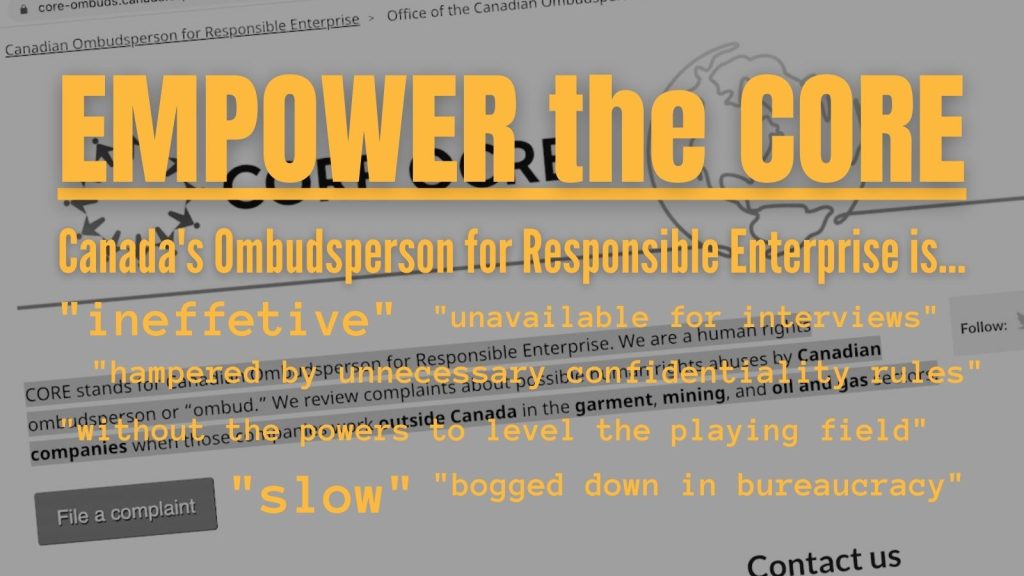Updated on 10 May 2023. Initially published on 11 April 2023.
Recent media reports exposing the ineffectiveness of Canada’s Ombudsperson for Responsible Enterprise (CORE) show it should immediately be given the powers to require the production of documents and compel witness testimony under oath from companies accused of alleged human rights and environmental abuses.
The federal government had initially pledged to empower the CORE with these investigatory powers but broke that promise when the CORE was launched.
According to a report on 10 April 2023 by the Globe and Mail’s Tavia Grant:
- Two of the groups whose complaints sparked the office’s first active cases said the CORE is “slow, ineffective and has created a process bogged down in bureaucracy”.
- The complaints process ‘has been hampered by “unnecessary” confidentiality rules, along with a failure so far to conduct an investigation into the issues raised’ according to Mehmet Tohti, the Executive Director of the Ottawa-based Uyghur Rights Advocacy Project.
- The length of time the CORE has taken so far amounts to “bureaucratic nonsense” according to Hugh Doherty, co-chair of the group Canadians in Support of Refugees in Dire Need.
Another investigation on 1 April 2023, by Ms. Grant at the Globe, found that:
- The CORE has still as yet to complete one single investigation in four years, despite an annual $4.9 million dollar budget, and a staff of 20 people
- There were more than 50 instances of alleged human rights abuses linked to Canadian companies in the last 5 years, in 30 countries, which Canadian authorities could investigate
- 14 human-rights organizations and labour union representatives, including the CNCA, resigned on the same day in 2019 from the CORE’s advisory board, having lost confidence in the government’s commitment to international corporate accountability.
- After Indigenous leaders testified that the CORE’s lack of powers made it unworthy of approaching, the CORE repeatedly made no one available for interviews, and e-mailed questions merely got replies to visit their website.
Ms. Grant published a subsequent article on 9 May 2023, revealing that:
- While the CORE is supposed to supply the International Trade Minister with status reports on the cases it is reviewing, the Minister has not received a single initial assessment report on any case, nor interim or final reports on reviews of companies.
- The Ombudsperson herself, despite not having done interviews or filed those reports, is paid between $183,600 and $216,000 a year.
Consequences
As quoted in the initial Globe investigation:
- The federal government’s broken promise to empower the CORE has meant that if victims of alleged corporate abuse go to the CORE, it “could actually deepen the harm that they’ve already experienced” because it “doesn’t have the powers to actually level the playing field with the company,” noted Catherine Coumans of MiningWatch Canada.
- Without more stringent oversight to ensure companies are respecting human rights, Canada’s reputation may suffer, and it could affect Canada’s ability to negotiate treaties that support businesses with host states, according to Penelope Simons at the University of Ottawa.
Empower the CORE: help Canada to stop lagging behind on human rights
As stated by former UN Working Group Chair Professor Surya Deva, Canada is “definitely lagging behind its Western counterparts,” “hasn’t adopted a business and human rights national action plan like Denmark or the Netherlands,” nor has Canada enacted a mandatory human rights and environmental due diligence law like France, Germany, and soon the EU, that force companies to address adverse impacts of their activities on people and the planet.
Giving Canada’s CORE real powers would be an excellent first step towards bringing Canada in-line with other countries that are making appropriate efforts to tackle human rights and environmental abuses by home-based multinational companies, importers, and their subsidiaries.
Aside from giving the CORE the powers to require the production of documents and compel witness testimony under oath, the federal government should also require the CORE to:
- Be more transparent
- Move much faster when it gets complaints
The CNCA has developed a model law and model Order in Council for the government to transform the CORE into an effective watchdog. A private members Bill is currently before the House of Commons, inspired by this model law: Bill C-263, An Act to establish the Office of the Commissioner for Responsible Business Conduct Abroad and to make consequential amendments to other Acts, would help finally make the CORE effective.
People who are harmed by Canadian companies operating abroad deserve to have their rights respected. It is long past time for Canada to give the CORE the basic minimum powers needed to do its job.




